This homemade disinfectant spray is nontoxic and super easy to make. This simple recipe leaves our homes smelling squeaky clean and fresh! We love this homemade spray because it requires basic ingredients that are probably already around the house such as water, white vinegar, alcohol, and some essential oils.
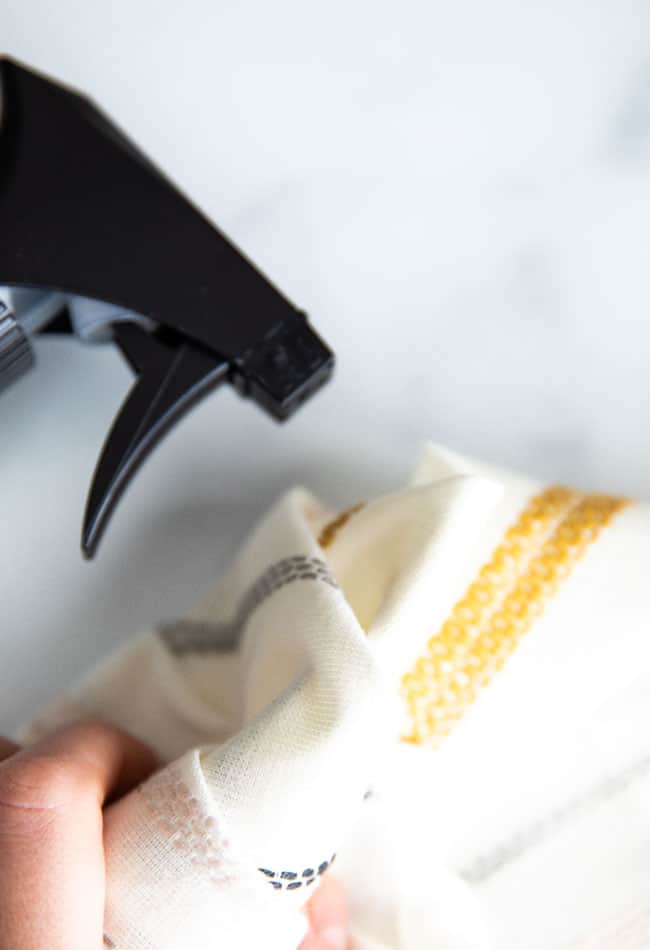
PIN HERE for later and follow my boards for more ideas
DISCLAIMER:
Please not that we are not medical professionals, doctors, pharmacists, chemical formulators or pharmacists. We are simply sharing our own families’ DIY germ-fighting household products. This is not medical advice and not meant to replace washing your hands throughly with soap and water! Use at your own risk.
If you are anything like us, you are probably running around the house disinfecting everything you see in sight. Since we are unable to go to the stores, we figured we could use our imaginations to whip up a homemade disinfectant spray. We are super excited to make this germ-killing spray from the comfort of our homes with just a handful of basic ingredients. This incredibly simple spray is so easy to make and smells delightful all thanks to eucalyptus.
Be sure to check out our other blog post where we talk about 3 different types of homemade cleaning products!
WHAT DO I NEED TO MAKE THIS DISINFECTANT SPRAY?
- Reusable spray bottle (glass or plastic) that is 16 fl oz.
- 2 cups of water
- White distilled vinegar
- 92.4% ethanol alcohol , try to get the highest proof alcohol you can find (such as Everclear which is 190 proof)
- Essential oil (eucalyptus or tea tree oil)
Need help finding a spray bottle? Re-purpose or recycle any spray bottle from previous cleaners or look at this tutorial!
**This solution contains vinegar and is not safe for stone surfaces such as granite or marble. Be sure to spot check in a small inconspicuous area for other surfaces that you are not sure
HOW DOES THIS SPRAY WORK?
This spray is great at disinfecting surfaces due to the alcohol and acidic content of vinegar. Not only are alcohol and vinegar wonderful for disinfecting things, but eucalyptus is, too. Eucalyptus has been intensely studied for being both antibacterial and antiviral, and we always have some of it in our homes because it smells so good.
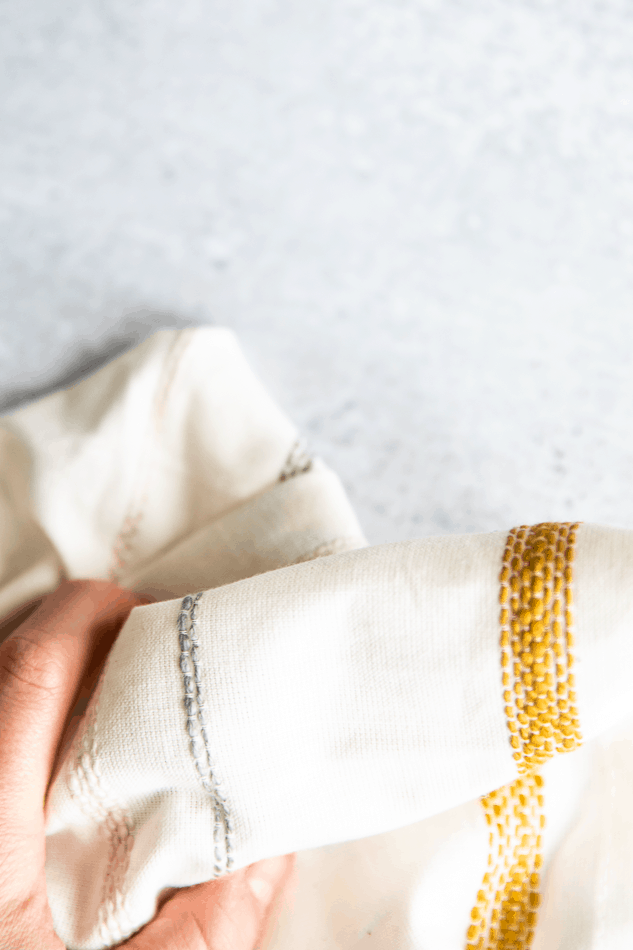
Just spray this germ killing solution on any nonporous surface, and let it sit for 10 minutes. After the 10 minutes are up, then simply wipe clean! It’s that easy.
WHITE VINEGAR AS A CLEANING AGENT
White vinegar contains high acidic levels which allows it to be pretty potent as a cleanser. Vinegar is super cheap and goes a long way, and we love that we do not have to go to the store to make this homemade disinfectant cleaner.
ETHANOL ALCOHOL (OR GRAIN ALCOHOL)
Ethanol is commonly used to clean surfaces, and it is known for being a strong disinfectant. This cleaning agent can be found in absolute and drinking alcohols, such as Everclear. The difference between ethanol and isopropyl alcohol is that ethyl alcohol contains only 1% of water, which means the rest (99%) is filled with alcohol. Isopropyl alcohol tends to have a bit more water.
If you do not have any ethanol alcohol, then the rubbing alcohol will work just fine as long as it has an alcohol content of at least 70%. Be sure to spot check in a small inconspicuous area for any surfaces that you are not sure of as rubbing alchohol can damage painted and varnished surface areas.
EUCALYPTUS ESSENTIAL OIL
So, maybe you are wondering what makes eucalyptus antiviral? Well, we like to refer to this article here to gain unbiased insight on these ingredients. If you do not have any eucalyptus, simply substitute tea tree or cinnamon oil.
HOW TO MAKE DISINFECTANT SPRAY WITH VINEGAR
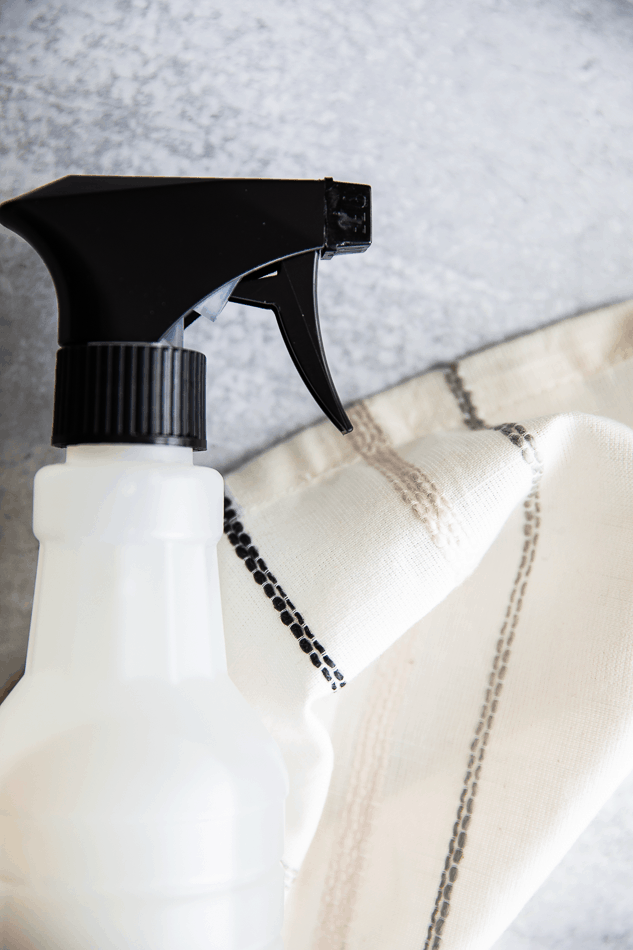
- Measure out the water, 1/2 cup vinegar, alcohol, and eucalyptus oil. Grab a reusable spray bottle.
- Carefully pour each ingredient into the bottle, and then put the top on. Gentle shake everything.
- It’s ready to use! Store this disinfectant spray for up to three months.
WHAT IF I DO NOT HAVE ANY ESSENTIAL OILS?
Although eucalyptus and or tea tree oils are highly encouraged, some times we just have to use what we have on hand. This powerful homemade spray is definitely still effective without the essential oils. Have some orange rinds? Just toss those into the spray for some additional fragrance.
WHERE CAN I USE THIS HOMEMADE SPRAY?
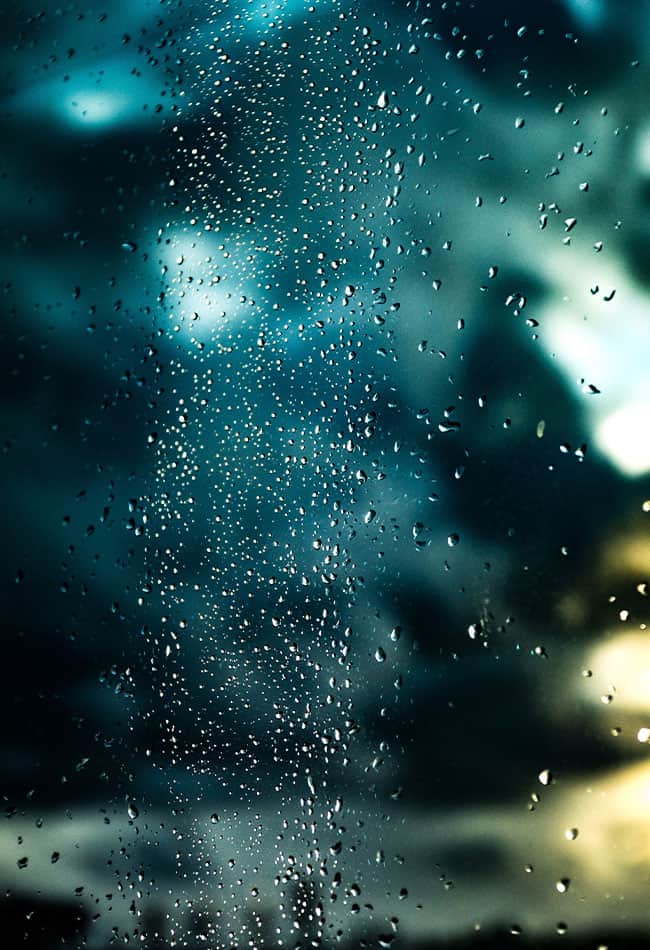
Use this spray on a variety of surfaces, such as:
- Bathrooms
- Glass
- Kitchen counters and appliances
- Doorknobs and light switches
- Children’s toys
Be careful, though, as this homemade disinfectant spray is not good for wood and natural stone due to the alcohol and vinegar. If interested in products that will work for both natural stone and wood, then refer to these cleaning products, here!
If interested in making homemade wipes, then simply just soak some square paper towels or reusable rags in bowl of solution. Store in a Ziploc bag and refill as necessary.
IF YOU LOVE THIS HOMEMADE CLEANER, THEN CHECK OUT THESE OTHER RESOURCES:
- 3 Homemade Cleaners with Essential Oils
- How to Make Homemade Playdough
- How to Make Cashew Butter
- How to Cook Salmon
- How to Make Steel Cut Oats
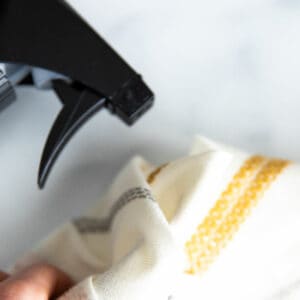
This homemade disinfectant spray fights off germs and it's super easy to make by using ingredients from around the house. Made within minutes, this cleaning solution is definitely a winner.
- 2 cups water
- 1/4 cup 92.4% ethanol alcohol , try to get the highest proof alcohol you can find (such as Everclear 190 proof)
- 1/2 cup white distilled vinegar
- 5 droplets essential oils , tea tree or eucalyptus oil
Combine all of the ingredients in a reusable spray bottle. Gently shake the bottle.
Spray on surfaces and let the spray sit for 10 minutes. Wipe clean.
**This solution contains vinegar and is not safe for stone surfaces such as granite or marble. Be sure to spot check in a small inconspicuous area for other surfaces that you are not sure of.
DISCLAIMER:
Please not that we are not medical professionals, doctors, pharmacists, chemical formulators or pharmacists. We are simply sharing our own families' DIY germ-fighting household products. This is not medical advice and not meant to replace washing your hands throughly with soap and water! Use at your own risk.

 Did you try this recipe?
Did you try this recipe?






Patricia -
thanks for this idea! trying it.